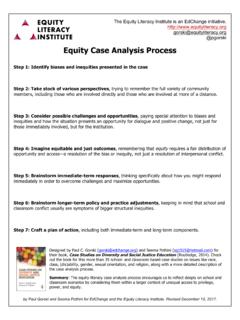Transcription of Equity Literacy Principles - EdChange - Advocating …
1 The Equity Literacy Institute is an EdChange initiative. @pgorski by Paul Gorski for EdChange and the Equity Literacy Institute. Revised December 9, 2017. Basic Principles for Equity Literacy An important aspect of Equity Literacy is its insistence on maximizing the integrity of transformative Equity practice. We must avoid being lulled by popular diversity approaches and frameworks that pose no threat to inequity that sometimes are popular because they are no real threat to inequity. The basic Principles of Equity Literacy help us ensure we keep a commitment to Equity at the center of our Equity work and the broader Equity conversation. 1. The Direct Confrontation Principle: There is no path to Equity that does not involve a direct confrontation with inequity. There is no path to racial Equity that does not involve a direct confrontation with interpersonal, institutional, and structural racism. Equity approaches that fail to directly confront inequity play a significant role in sustaining inequity.
2 2. The Poverty of Culture Principle: Inequities are primarily power and privilege problems, not primarily cultural problems. Equity requires power and privilege solutions, not just cultural solutions. Frameworks that attend to diversity purely in vague cultural terms, like the culture of poverty, are no threat to inequity. 3. The Equity Ideology Principle: Equity is more than a list of practical strategies. It is a lens and an ideological commitment. There are no practical strategies that will help us develop equitable institutions if we are unwilling to deepen our understandings of Equity and inequity. 4. The Prioritization Principle: Each policy and practice decision should be examined through the question, "How will this impact the most marginalized members of our community?" Equity is about prioritizing their interests. 5. The Redistribution Principle: Equity requires the redistribution of material, cultural, and social access and opportunity.
3 If we cannot explain how our Equity initiatives redistribute access and opportunity, we should reconsider them. 6. The Fix Injustice, Not Kids Principle: Educational outcome disparities are not the result of deficiencies in marginalized communities cultures, mindsets, or grittiness, but rather of inequities. Equity initiatives focus, not on fixing marginalized people, but on fixing the conditions that marginalize people. 7. The One Size Fits Few Principle: No individual identity group shares a single mindset, value system, learning style, or communication style. Identity-specific Equity frameworks (like group-level "learning styles") almost always are based on simplicity and stereotypes, not Equity . 8. The Evidence-Informed Equity Principle: Equity initiatives should be based on evidence for what works rather than trendiness. Evidence can mean quantitative research, but it can also mean the stories and experiences of marginalized people in your institution.
4


















